Kidney stones are the most common disease of the urinary tract. Kidney stones can occur at any age, in any subject, but are most common in people from 30-60 years old.
There are many risk factors that cause urinary stones in the community such as race, geography, and climate. Vietnam is located in a tropical climate zone, hot weather will cause the body to sweat a lot, the urine will be concentrated, causing the salt crystals in the urine to become saturated and easily precipitate to form stones in the kidneys and bladder.
One of the reasons why kidney stones are such a dangerous disease is that it is very difficult to detect the disease in its early stages. Kidney stone cases are often only detected and treated when the disease has become severe and the risk of kidney stone complications increases.
What is kidney stone disease?
When the urinary system begins to deposit impurities, calcium deposits, kidney deposits, from which stones gradually form, these crystals and small stones tend to follow the urinary tract to be excreted outside, not causing harm to the health of the kidneys in particular or the body in general.
However, during the journey of the crystallized stone, if there is an obstacle or problem that causes the stone to get stuck, over time it will accumulate with other small stones to form larger stones called kidney stones.
It is the appearance of these increasingly large stones that causes urine to stagnate, obstructing the flow of urine, leading to dilation or obstruction of the lower urinary tract.
The larger the stone, the higher the risk of kidney stone complications, including urinary tract infections, kidney failure, hydronephrosis, cystitis, urinary tract obstruction, etc. If these complications continue to be untreated properly and promptly, they will greatly affect the health and even the life of the patient.
Complications of kidney stones
Doctors share that patients with kidney stones who do not receive complete treatment or whose condition progresses rapidly and becomes severe will have a higher risk of developing the following kidney stone complications.
Urinary tract infection
The first complication of kidney stones is urinary tract infection. The stone is located in the urinary tract, blocking the urine from exiting, causing more and more dirt and bacteria to accumulate in the urinary tract.
In case the stone is large or has a sharp shape that scratches the urinary tract, this is an opportunity for dirt and bacteria to enter and cause inflammation and urinary tract infection.
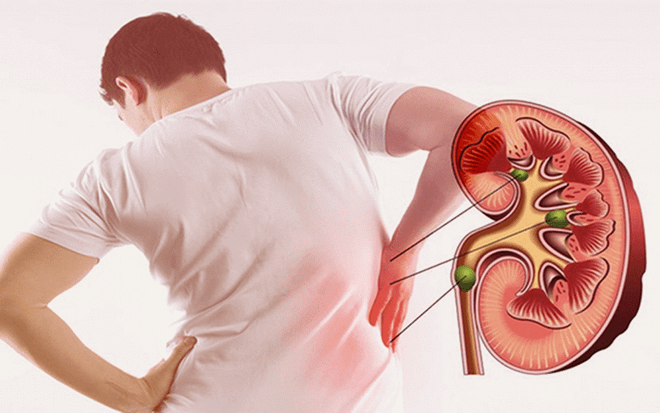
Kidney stone complications are urinary tract infections, patients will have symptoms such as high fever, pain when urinating, frequent urination, blood in urine, pus in urine,... These symptoms may be accompanied by a feeling of very uncomfortable back pain, hindering daily activities.
Kidney failure - Dangerous complications of kidney stones
When it comes to kidney stone complications, we cannot ignore kidney failure - one of the complications with high risk and certain level of danger.
When the stones in the urinary tract grow too large or many stones move together, they will cause the urinary tract to become blocked, causing the patient to have complete urinary obstruction. This phenomenon, if maintained long enough, can threaten the patient's life.
When the bladder and kidneys are congested, urine cannot be excreted, causing dirt and bacteria to accumulate in the body, causing infection and destroying the glomerular tissue. The number of kidney cells lost is about 75%, causing a high risk of kidney failure.
At this time, the patient needs dialysis, a new kidney transplant or removal of the failed kidney.
Kidney rupture
The above complications of kidney stones, if not treated promptly, will lead to the risk of kidney rupture and complete kidney destruction. The kidney retains too much water for a long time to the limit of tolerance, the entire kidney tissue is destroyed and the kidney ruptures.
Although this is a rare complication, if it occurs, when the kidney is congested, it will stimulate the nerves that affect the renal cortex, causing painful cramps, severe urinary tract infections, or urinary tract necrosis.
Urinary tract obstruction
A common complication of kidney stones is urinary tract obstruction. When kidney stones move to the urethra but are too large in size and cannot escape the urethra, they will stimulate the urethra to contract strongly to push the stones out, releasing the urinary tract obstruction.
This is also when you feel abdominal distension accompanied by dull pain. If the stone is not expelled, the urethra contracts even more strongly, causing the pain to increase.
What should kidney stone patients do?
To limit the risk of kidney stone complications mentioned above, people who have kidney stones or do not have them need to have regular general health check-ups to detect early signs of health abnormalities, thereby treating the disease early and reducing the possibility of complications, with a high cure rate.
In addition, when you have kidney stones and have been treated, you also need to pay attention to your health carefully to avoid the risk of recurrence. Many cases of kidney stones after treatment still recur with more stones, the condition is also more severe than before, threatening health and life.
During the treatment of kidney stones, patients are also prescribed pain relievers and antibiotics to limit the possibility of infection causing pain to the patient.
Stones under 5mm in size are usually treated with oral medication and it is recommended to drink plenty of water to increase excretion and excretion of stones.
Early treatment helps reduce the risk of complications of kidney stones.
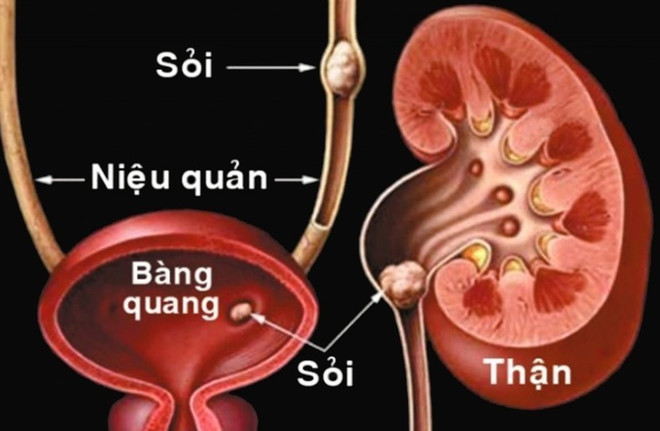
For patients with larger stones, doctors will consider kidney stone surgery or lithotripsy using modern methods for the most effective and safest treatment for the patient.
Some options for removing large kidney stones:
- Extracorporeal shock wave lithotripsy;
- Percutaneous endoscopic kidney stone surgery;
- Endoscopic lithotripsy with flexible tube;
- Endoscopic lithotripsy with rigid endoscope.
In general, kidney stone complications are very dangerous and unpredictable because the disease progresses rapidly and is difficult to predict.
In addition to taking the correct dose of medication as prescribed by the doctor, removing kidney stones by intervention,... patients also need to adjust their eating and living habits, increase green vegetables, reduce consumption of foods high in calcium, exercise regularly, limit beer, alcohol and tobacco./.
Source: https://www.vietnamplus.vn/benh-soi-than-va-nhung-bien-chung-nguy-hiem-khong-the-chu-quan-post1070847.vnp






















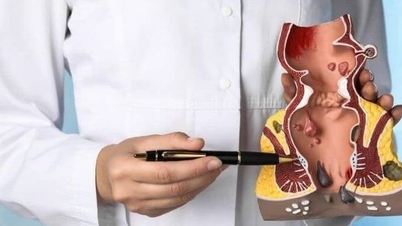










![[Photo] Worshiping the Tuyet Son statue - a nearly 400-year-old treasure at Keo Pagoda](/_next/image?url=https%3A%2F%2Fvphoto.vietnam.vn%2Fthumb%2F1200x675%2Fvietnam%2Fresource%2FIMAGE%2F2025%2F12%2F02%2F1764679323086_ndo_br_tempimageomw0hi-4884-jpg.webp&w=3840&q=75)
![[Photo] Parade to celebrate the 50th anniversary of Laos' National Day](/_next/image?url=https%3A%2F%2Fvphoto.vietnam.vn%2Fthumb%2F1200x675%2Fvietnam%2Fresource%2FIMAGE%2F2025%2F12%2F02%2F1764691918289_ndo_br_0-jpg.webp&w=3840&q=75)




























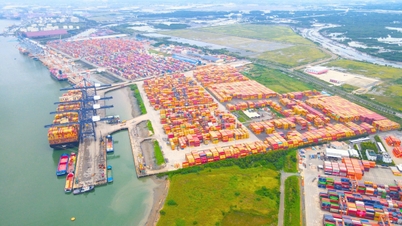













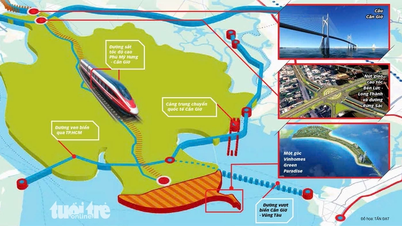









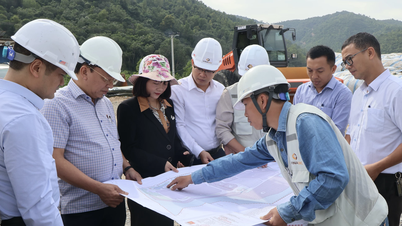





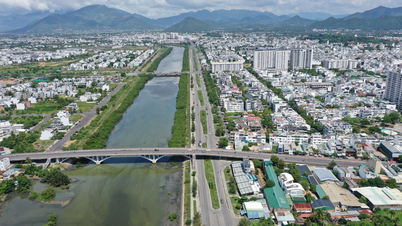
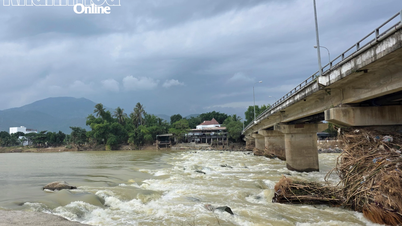












Comment (0)